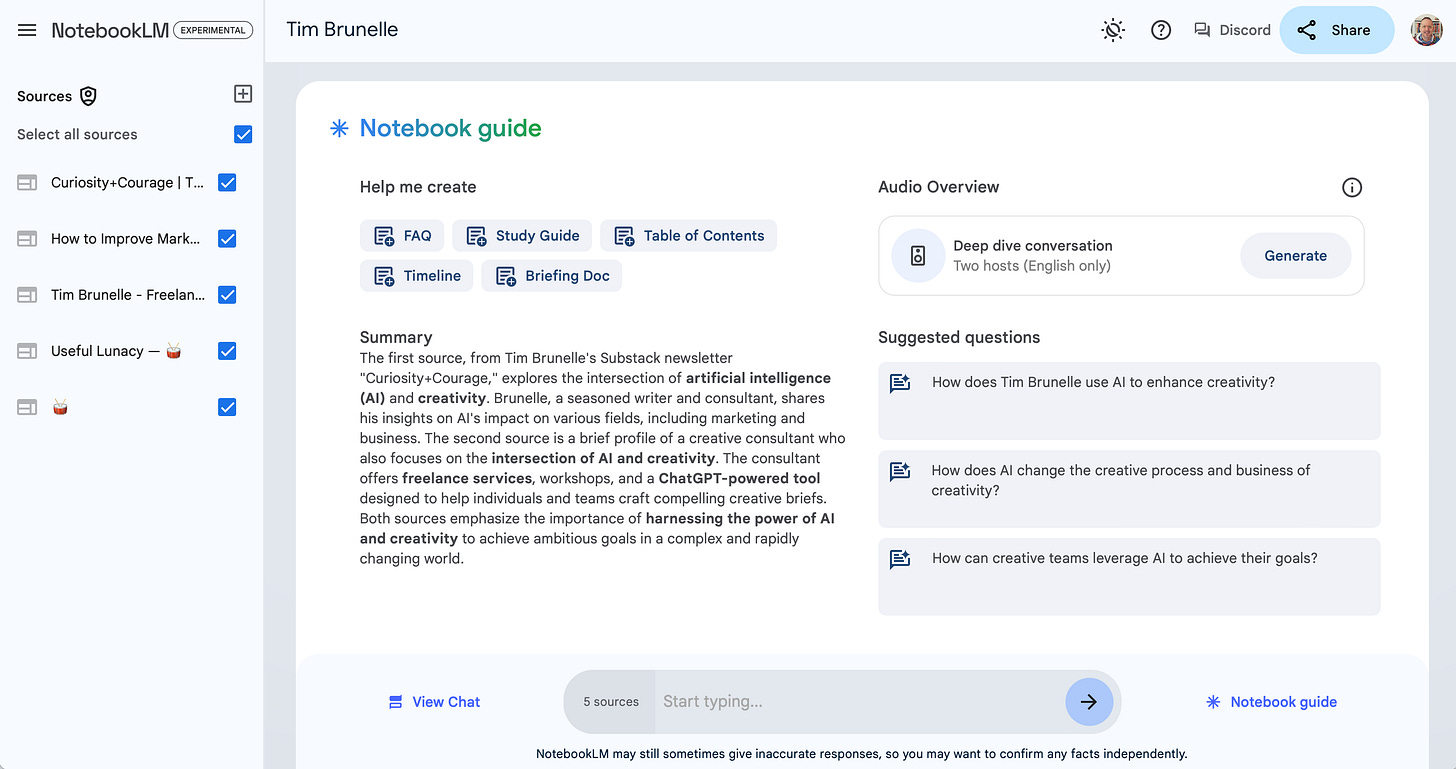152: Ask the wrong questions
Google's NotebookLM audio generation caught me off guard
This is the first time I’ve actually been gobsmacked by an AI.
I played it for my wife. I texted it to my friends.
Unlike previous experiences with image, video or text generation, this one hit different. This AI was weird, unexpected, and ultimately valuable (at least to me).
Now I’d seen the headlines announcing Google’s NotebookLM “Audio Overview” capability last week. But they talked about feeding it science documents which two AI voices would summarize. Yawn.
I forgot an important life lesson. My grandfather and I used to visit the tool section of the hardware store, where he’d pick up one of the items and ask, “What else could you do with it?”
One of the critical insights around AI is to acknowledge intended use, but then spend lots more time exploring what else you might do with it. Yes, Udio or Suno can generate songs but what if you ignore the music and focus on how they write language? Mark Smith taught me image description (i.e. ask an LLM to describe an image) can fuel intriguing brand and storytelling persona—a picture is literally a thousand words.
If an AI can help you think differently, that’s the win
So, science summaries sound dull. But then I noticed examples of NotebookLM’s audio generation from people like Robert Stephens. He took “20-30 county docs, environmental impact reports, public comments, blog posts, etc.” and generated a spoken overview of an issue he cares about.
What if I fed NotebookLM this Substack, my old blog, my LinkedIn, and a bunch of my website pages?
Here’s the thing—I didn’t know what to expect as a result. Because I’d certainly used ChatGPT, Claude and other LLMs to search and summarize my own content.
But I wasn’t expecting this:
[Here’s a PDF transcript of the entire 11 minutes.]
This “deep dive” took maybe three minutes to render.
And it’s not perfect or accurate (I’ve never worked at agency Colle+McVoy, much less for 20 years; and this LLM gives me way, way, way too much credit for my small contributions to Volkswagen’s “Drivers wanted” campaign).
But it does reorient my own sense of content I know really well—because I wrote it all. That’s where my surprise is rooted. Somehow, this LLM got me to rethink material I thought I understood.
Some quick ideas to leverage audio overview:
Upload customer personas from your brand guide, interview transcripts, and customer service call records. What story emerges about the people you’re trying to serve?
Gather your competitor’s earnings call transcripts, any recent journalism on their brands. What story might NotebookLM reveal which you hadn’t considered before?
Scrape all your social comments, Yelp and Google reviews. What comes to light from those sources which you can leverage?
Utilize a half dozen curriculums within a degree major and illuminate a fresh spoken view of the degree program.
Yes, skeptics—you could absolutely produce a textually similar result using ChatGPT, Claude, Le Chat, et al. But you’d have to define a prompt. And your end product wouldn’t be a podcast-like object, which felt so immediate and actionable.
And NotebookLM offers all those text-based options anyway.

What else might emerge from this approach?
I’m curious what you experience!


For some reason this reminded me of an interview I watched a few years ago with Michel Gondry, in which he says that, because he’s French and has to work with English-speaking people, there are many times when he misunderstands what they’re saying — and from those misunderstandings he gets ideas.